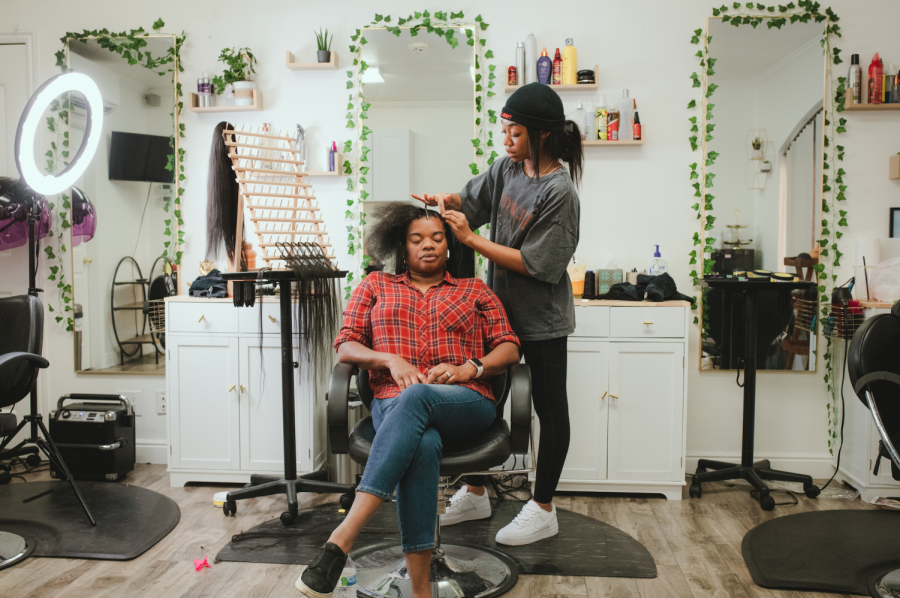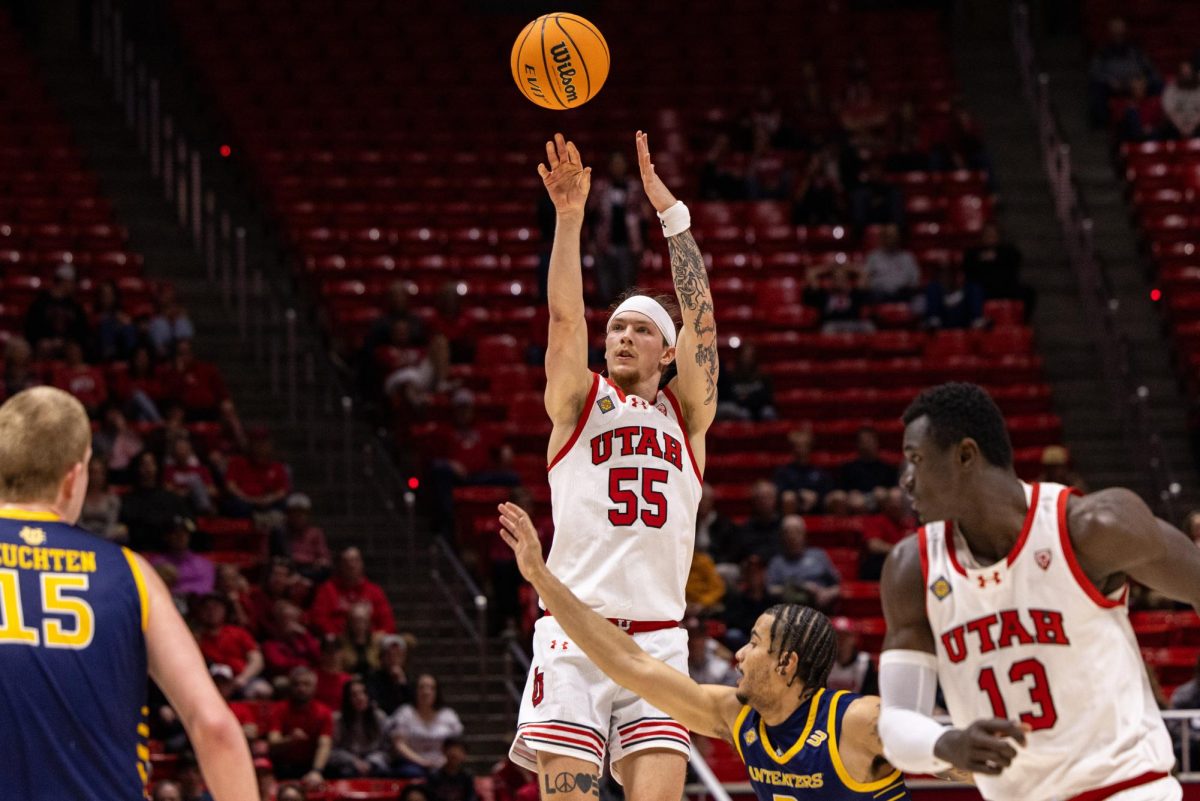Alexander: Protect Black Hairstyles
Akilah Woodford-Sims braiding Latesia’s hair at Beyond Braids in Salt Lake City on Feb. 10, 2021 (Photo by Emily Rincon | The Daily Utah Chronicle)
February 15, 2022
We are only one week into Black History Month, and Black excellence is already under attack. Across the country, bomb threats have terrorized historically Black colleges and universities, while the University of Utah’s Black Cultural Center faced threats back in January. Threats like these are nothing new, as America has a long and violent history of trying to suppress Black education and achievement. But we’ve had enough of racist white people challenging our right to pursue our ambitions and exist authentically. Black identity deserves acceptance.
Luckily, Utah is moving in the right direction towards accepting Black identity in the form of S.B. 117, sponsored by Sen. Derek Kitchen. Like California’s CROWN Act, S.B. 117 amends Utah’s Antidiscrimination Act to provide protection for Black hairstyles in areas like employment, school and court. Hairstyles like Afros, curls, braids, dreadlocks and twists, which are considered “protective hairstyles” for Black hair are protected. These hairstyles are often deemed “unprofessional” and can be discriminated against. Crafting standards of professionalism and beauty to exclude Black hair is racist, and without proper legislation to protect Black hair, white people will continue to reject Black identity. I support the passage of Sen. Kitchen’s bill to protect Black hair, and every Utah legislator should too.
Utah originally passed its Antidiscrimination Act following the passage of the Civil Rights Act of 1964. Since then, the act has been modified a great deal, including the passage of the landmark LGBT Rights Bill in 2015. However, even after 58 years, Black hair is still not included in Utah’s Antidiscrimination Act and therefore is subjected to legal discrimination in multiple areas of the state. Sen. Kitchen got the idea to write this bill when his constituents noticed other states’ legislation to protect Black hair. Kitchen explained, “The point of the bill is to protect people from losing their jobs because of something they can’t control. I’m working on this with people I represent in the community who have been concerned about the way Black and Brown people have been treated in the community.”
When Kitchen introduced the bill in last year’s General Session, several Republican lawmakers voiced their opposition and voted against it, claiming they “did not see the need for such legislation.” One even went so far as to make ignorant remarks towards the few Black women who testified on behalf of the bill. But this year, S.B. 117 is back, consistent with Utah State Code, and on its way to the Senate Business and Labor Committee’s agenda.
For Black men and women, legislation like S.B. 117 and the CROWN Act prove the importance of ending hair-based discrimination. In many workplace settings, Black men and women are expected to “dress the part” to stay employed, meaning they must conform to Eurocentric and white beauty standards. Those who sport natural hair or protective hairstyles face microaggressions in the workplace and may be denied jobs.
One Black woman on campus — who has been granted anonymity by The Daily Utah Chronicle due to her safety concerns after a recent bomb threat targeting the U’s Black Cultural Center — said that her dreams of working in environmental justice were dashed when she couldn’t find a job application that did not prohibit her hairstyle. “To me, this felt really unfair because I didn’t have alternative hair options in a way that maybe other women did. [Dreadlocks] was the easiest way of maintaining the health of my hair that didn’t involve things like using chemicals or heat to straighten it.” These restrictions on Black hair forced her to switch careers entirely. “I wasn’t willing to bow down to those standards.”
Race-based hair discrimination also affects students. Last year, a high school softball umpire forced a Black student-athlete to cut off the beads in her box braids in the middle of a game. The same thing happened in 2019 when a white referee told then 16-year-old Andrew Johnson to cut his dreadlocks or forfeit his wrestling match. Some school districts even ban specific Black hairstyles, which prevents students from attending events like prom and graduation. Black people should never have to suppress their identity and conform to white beauty standards just to continue existing.
Discrimination against Black hairstyles is not new and will continue until legislation like S.B. 117 passes in Utah. The bill recognizes and combats the discrimination Black people face regarding their natural hair or the way they choose to wear it. Any legislator who opposes the bill or votes against it supports discrimination against Black hairstyles. Lawmakers who believe there’s no need for legislation like S.B. 117 deny the valid emotion and discrimination experiences of Black people. By claiming to “not-see-color,” white lawmakers delude themselves as “not racist” simply because they don’t engage in hate crimes or are active members of the nearest KKK chapter. But racism comes in many forms and failing to support S.B. 117 is a form of racism.
We desperately need S.B. 117 and the CROWN Act to protect and ensure Black hair is accepted and welcome. Discouraging Black people from being authentic and true to their own selves sends a clear message: “Black is not professional, nor is it beautiful.” We need to fight this message with our own.
I applaud Sen. Kitchen’s initiative. His bill gives me hope. But until the Utah Legislature and the rest of Utah accept Black hair, we cannot move forward to stop hair-based discrimination. S.B. 117 is the step we need towards reducing that discrimination. And it’s up to our legislators to make that happen by voting in favor of the bill.










John Hedberg • Feb 20, 2022 at 8:14 am
Everyone deserves to be treated equally well, as a beloved sister or brother, child of the Infinite Love who made us, with all our fallibilities and imperfections, and all our diverse inner beauties, native worth, and blossoming potentials. The only thing that keeps our common humanity from finding joyful expression is when we insist on seeing each other as less than fully human, less than fully equal individuals, as less than fully people who share a common human experience all through our diverse lives. The real wonder and diversity are within. This is why folks who insist on seeing each other as different based on externals like eye shape, hip curvature, hair waviness, skin smoothness, how our clothes hang and what they’re made of, and what kinds of scents we wear are considered “superficial” and “blind”, just like those who judge each other as less than fully human for other meaningless external factors, like race, gender, identity, ethnicity, religion, place of origin, or socio-economic status. What makes us human is something within which makes up 99.9% of who we are and of what we experience. Otherwise, reading a book, seeing a painting, or hearing music someone else wrote wouldn’t affect us to laughter, tears, tenderness, anguish, fondness, thoughtfulness, or a move to help. Otherwise, everything we write in this publication would be vain, since we’d have no human frame of reference to see each others’ meaning, and feel it! Either we see our common imperfections and accept each other for it out of love, since we’re all human, or we look at each other like snarling infants who love nothing but our own selfish feelings and superficial grievances, who live to hurt and hate and justify fear, simply because they refuse to see the whole person inside them and identify with the whole person in front of them, as fully human and fully equal, just as full of fallibility and imperfections, just as full of bright unexpressed diverse potentials, and just as worthy of love, forgiveness, and friendship, since we’re all One.
Miss this message, and you’ve missed the living heart of religion, philosophy, science, and human civil rights, and an ongoing march forward by generations of diverse human beings going back literally thousands of years. To the people who hate, YOUR hatred is always justified, just nobody else’s, like a spoiled child in need of another diaper change. Love one another, even as our parents loved us when we were most annoying and least “deserving”, and we’ve truly seen ourselves in God’s eyes, as our parents did, not judged by the worth of our imperfections (and we all have them), but judged by our ability to outgrow them and express all the diverse wonder each soul carries and has to give, to share out of love, and to rejoice together therein because we’ve made the necessary suffering and grief of life meaningful in overcoming these together, even as our parents did with us.
Time to grow up.
Just so you know, I worked for several years in various entry level jobs in several industries, and I was also told how long I could wear my hair, how I could dress (the “dress code”), whether I could wear a beard or moustache, and how I was allowed to address other people. In other words, every employer does this, the more “corporate” the employer, the more self-righteous they tend to be. I’ve been sent home and threatened with termination because I forgot to wear a tie or wore the wrong color clothes to work out of necessity (that’s all I had). I once grew a beard during a trip to see my sister, and when I returned, I was told I had until the end of the week to shave it off, or I’d be let go. FYI, my work quality was at the top 10% in my department, but that didn’t stop the discrimination. I’ve been an ugly kid my whole life, with all the bruises and lost teeth going back to elementary school. This is a human experience we’re sharing. If you think it’s only happening to you, have you thought about sharing a little grownup compassion for everyone else on the planet?
“Not seeing color” in an effort to identify each other only by our full and common humanity is the opposite of racism. In many ways, it defines the entire scope of ‘the humanities’, here on campus and around the world, whether visual art, music, literature, theater, cuisine, it’s all about mutual appreciation because of the 99.9% of what we share as human beings, and our ability to truly see that wonder and beauty, share that suffering and the joy in overcoming it, together as family. “We are One”. That’s the identity which can never end all suffering, but which can end needless suffering, and which makes the growing pains we all endure meaningful together, as maturing family who choose to love all we share, love each person as wholly unique and fully human, and sit down together at the end of each day to share laughter and stories, music and dancing, under the knowing stars, even as Dr. King saw all our grandchildren doing together. Out of knowing and mature love, that’s always been the vision.
Every new generation gets to learn this fresh. Growth is not error-free or painless, but out of love for every good thing we have and share in our common identity, how could it be more worthwhile, when your suffering is my suffering, and your victory is my victory? That’s genuine love, even as our parents chose to experience it with each of us, whether we seemed “redeemable” in a particular tantrum moment or not! 😄 That mature love toward each other sees through the surface of the moment at the lasting diverse value learning to express itself in joy. In each one of us!
It’s not all about you.
Is any of this making sense at all?
With Love, All the Best!
J Hedberg